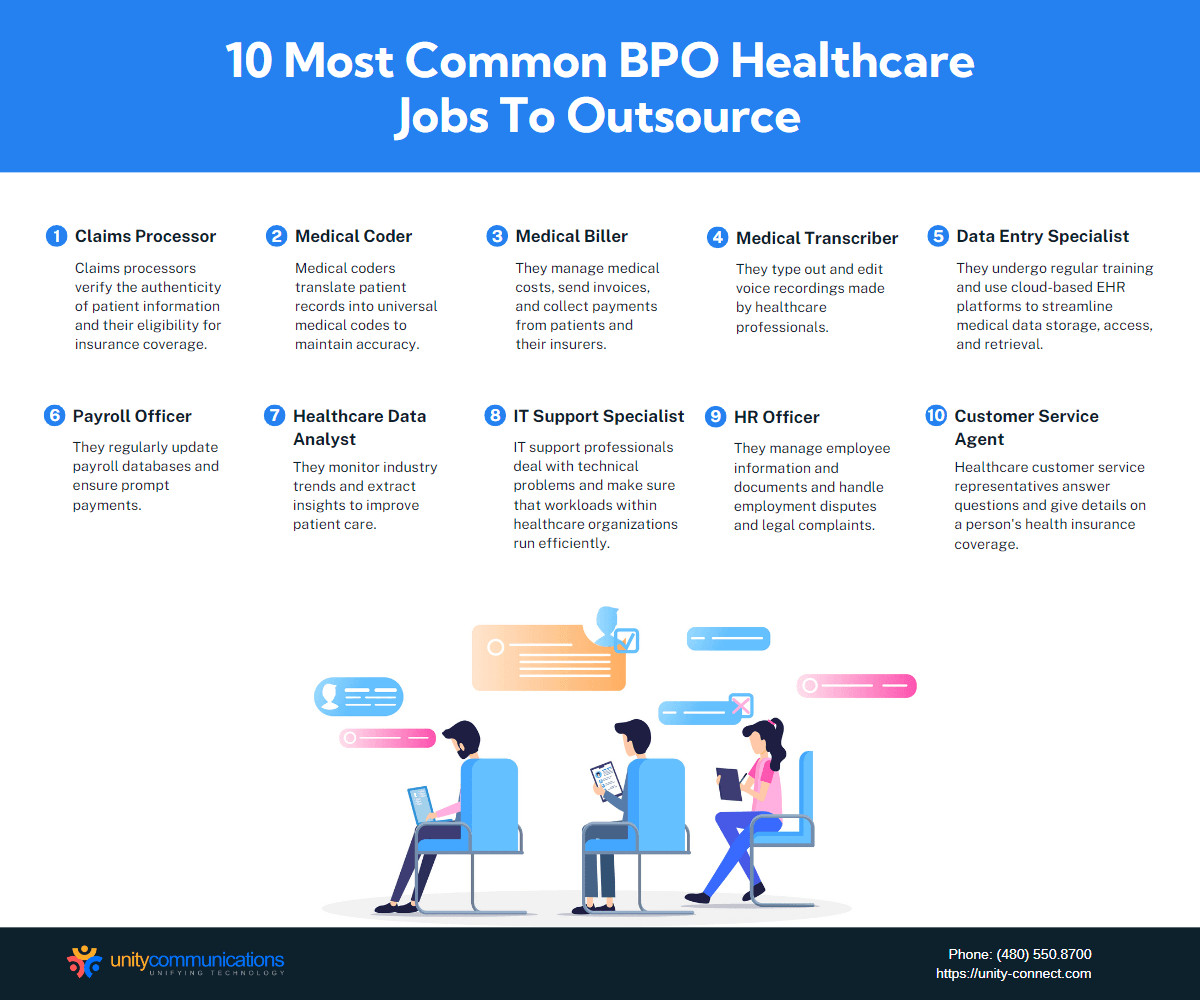IN THIS ARTICLE
Table of Contents
The healthcare sector is vital in fostering a patient’s physical, mental, and social well-being. But because of the extraordinary need for healthcare, the back-office backlogs in healthcare organizations threaten to overwhelm the quality of patient care.
Business process outsourcing (BPO), specifically healthcare BPO, offers a cost-efficient way to streamline these essential administrative tasks. Highly competent service vendors provide various BPO healthcare specialists to take over these tasks and enable you to focus on your primary role – providing outstanding patient care.
Keep reading to learn more about the jobs healthcare BPO can do for you and why outsourcing them benefits your medical organization.
10 Most Common BPO Healthcare Jobs To Outsource

Most clinics, hospitals, and other medical organizations outsource their non-clinical tasks. As a result, the global healthcare BPO market is continuously growing. Reports predict it might be valued at almost $756 billion by 2030. This is no surprise; BPO companies use trained personnel and sophisticated solutions to help healthcare professionals focus on patient care.
But before you sign a deal with a service provider, know the different healthcare roles you can outsource. For example, you can start with areas where you have little to no expertise, such as record-keeping and invoicing. The patient’s health comes first, so always keep your specializations in-house.
Treat outsourcing as a supplement to your primary services and a way to fill in the gaps in your operations. Below are the typical healthcare jobs worth outsourcing to a BPO service provider.
1. Claims Processor
Claims processors review and validate insurance claims. They verify the authenticity of patient information and their eligibility for insurance coverage. Other responsibilities include:
- Preparing and producing documents and guidelines for policyholders
- Processing reimbursements upon approval
- Responding to insurance-related inquiries
- Reporting management issues and updates
- Conducting analysis and case management
A reliable claims processor should:
- Understand various claim types, policy documents, and other paperwork
- Pay attention to client inquiries and submissions
- Communicate and relay information clearly
- Collect and analyze relevant data for verification purposes
- Be mindful and observant of all essential details
2. Medical Coder
Medical coders translate patient records into universal medical codes to maintain accuracy. Insurance companies and healthcare providers use such codes for record-keeping and billing. The activities below are also part of the responsibilities of a medical coder.
- Code patient encounters, physician’s notes, lab reports, and other medical data
- Adhere to medical coding guidelines and policies
- Ensure proper medical data collection, research, and filing
- Identify and address document deficiencies
- Validate documentation for diagnoses, procedures, and treatment results
- Pin down diagnostic and procedural information
- Perform chart audits
- Make sure all medical documents are grammatically correct
Healthcare and insurance providers emphasize data precision because even a tiny mistake can threaten a patient’s life. Thus, individuals performing this BPO healthcare job must be:
- Detail-oriented
- Highly ethical
- Organized
- Articulate
- Analytical
- Technically proficient
3. Medical Biller
The primary responsibilities of medical billers are to manage medical costs, send invoices, and collect payments from patients and their insurers. They work with patients to create and handle reasonable payment plans. Reliable medical billers and coders share many of the same qualities. Medical billers are tasked with:
- Logging patient data into administrative systems
- Recording information on outstanding claims
- Performing audits and health insurance program reviews
- Resolving payment denial instances
4. Medical Transcriber
Medical transcribers are also known as medical transcriptionists or medical language specialists. They type out and edit voice recordings made by healthcare professionals. These recordings contain patient symptoms, test results, and diagnoses. In addition to transcriptions, medical transcribers perform duties such as:
- Creating reports, correspondence, and other administrative materials
- Proofreading transcriptions for grammar, spelling, and correct medical terminology
- Storing and monitoring medical files and databases
This BPO healthcare job requires varied skills to transcribe medical records accurately and efficiently. Hence, medical transcriptionists must:
- Have effective oral and written communication skills
- Use medical dictionaries and drug reference books for grammar and spelling
- Be familiar with transcription software such as audio and word-processing applications
- Accomplish assignments according to deadlines
- Have in-depth knowledge of medical terms and language for editing transcripts
- Keep patient data and medical records confidential
5. Data Entry Specialist
In the healthcare BPO industry, data entry specialists input patient data into electronic health record (EHR) systems. They undergo regular training and use cloud-based EHR platforms to streamline medical data storage, access, and retrieval. Below are some duties of data entry specialists.
- Gather data from different departments
- Maintain and monitor digital hospital records
- Prepare and process reports
- Operate office equipment
Data entry is one of the most common BPO healthcare jobs. It is often associated with other positions such as medical billers and coders. Standalone data entry roles are available for specialized work, such as dealing with insurance or federal billing systems. This simple job requires qualifications such as:
- Excellent organizational skills
- Strong verbal and written communication skills
- Moderate to fast typing skills
- Proficiency in word-processing applications
- High adherence to rules and ethics
6. Payroll Officer
Payroll officers prepare and release compensation for all medical staff. They regularly update payroll databases and ensure prompt payments. A smooth and accurate payroll process is the core target of their work. Other responsibilities include:
- Gathering daily, weekly, or monthly digital timesheets
- Computing salaries, bonuses, and allowances using software
- Scheduling and distributing bank payments
- Reporting on payroll costs
- Making sure wages and tax withholdings adhere to regulations
A proficient payroll officer must have the following qualifications:
- Familiarity with human resources (HR) information and accounting systems
- Strong mathematical skills and an ability to identify numerical errors
- Knowledge of labor policies and procedures
- Excellent time management skills
- Ability to manage sensitive data
7. Healthcare Data Analyst
Collecting, analyzing, and interpreting healthcare information from multiple resources are the primary duties of healthcare data analysts. They monitor industry trends and extract insights to improve patient care. They also perform these medical BPO services daily:
- Understand healthcare operations and systems
- Develop and implement record-keeping strategies
- Assess and process raw data
- Identify discrepancies and patterns in health services
- Produce models and reports to improve healthcare operations
- Recommend ways to boost healthcare quality and reduce operating costs
- Work with management teams to execute recommended enhancements
This BPO healthcare job requires employees to hold qualifications and skills such as:
- Proficiency in data analysis and visualization methods
- Familiarity with healthcare rules and processes
- Knowledge to extract, transform, and load frameworks
- Experience in structured query language (SQL) and analysis tools
- Enterprise data warehouse and data management software skills
- Analytical and communication skills
- Aptitude for organization and problem-solving
8. IT Support Specialist
Information technology (IT) support specialists address technical issues and ensure that workloads within healthcare organizations run smoothly. Support engineers maintain the hardware and software infrastructure. They also run updates to improve IT systems.
A reliable IT support specialist must have extensive experience delivering assistance in a fast-paced environment. Seamless technology and infrastructure operations help medical providers boost productivity. Other tasks for this BPO healthcare job include:
- Assisting staff and clients with their IT needs
- Training end users on hardware functionalities and software tools
- Monitoring EHR system performance
- Tracking and addressing system vulnerabilities
- Documenting processes and conducting diagnostic tests
- Implementing strict security and compliance measures
9. HR Officer
HR officers handle all aspects of a healthcare provider’s employment processes, from recruitment to onboarding and training. Their specific daily assignments are listed below.
- Prepare job descriptions and recruitment campaigns.
- Monitor and evaluate employee performance
- Develop and implement workforce engagement programs
- Discuss work policies and procedures
- Conduct regular consultations related to staffing and performance issues
- Manage employee information and documents
- Handle employment disputes and legal complaints
HR officers require the following skills and traits to be successful:
- Effective oral and written communication skills
- Knowledge of employment legislation
- Understanding of HR functions and best practices
- Strong interpersonal skills
- Excellent time management
10. Customer Service Agent
Healthcare customer service agents address inquiries and provide information on an individual’s health insurance coverage. They usually handle healthcare BPO services in contact centers owned by or affiliated with health insurance providers. Using advanced contact center software solutions, these workers perform tasks such as:
- Responding to inquiries using multiple communication channels
- Resolving claim-related problems
- Collecting, organizing, and analyzing insurance data
- Explaining details regarding health insurance benefits, policies, and procedures
- Reminding members of outstanding co-payments
- Addressing and forwarding claim requests to the appropriate departments
Customer service establishes a solid foundation for provider-client relationships. Therefore, agents must have these skills to provide a superb customer experience:
- Emotional intelligence
- Healthcare-specific technical proficiency
- Problem-solving abilities
- Strong oral and written communication skills
- Customer-centric mindset
Why Outsource Your BPO Healthcare Jobs?

The healthcare industry is a crucial sector that contributes to every individual’s wellness. As the demand for health services grows, backlogs and administrative tasks also grow.
Thus, medical providers rely on outsourcing to reduce operating expenses and improve productivity without compromising the quality of patient care.
Factors to Consider When Outsourcing
Before exploring the reasons you should outsource BPO healthcare jobs, here are some factors you should consider before outsourcing.
- Changing patient expectations. Digital transformation has changed patients’ expectations of service and accessibility. Similar to other industries, healthcare consumers increasingly prefer and expect omnichannel options. Third-party agents can efficiently use integrated contact center solutions to fill such needs.
- Staff shortages. Morning Consult reveals in its 2021 survey that 18% of healthcare employees quit their jobs during the pandemic. The report notes that insufficient pay and burnout led to workers leaving their posts. BPO providers help address staff shortfalls by providing well-trained professionals at affordable costs.
- Time-consuming paperwork. Too much paperwork hinders medical providers from delivering high-quality patient care. Back-office incompetency also results in errors. BPO contractors specialize in administrative work, enabling in-house healthcare teams to prioritize their core duties.
- Service quality. Growing administrative workloads and backlogs for employees affect their ability to provide healthcare. Overwork also leads to poor performance and service quality. Outside workers let in-house teams focus on improving patient care by streamlining back-office tasks.
- Data privacy and security. Limited time and expertise prevent in-house staff from monitoring data privacy and security. This gap increases the risks of cyberattacks and data breaches. Employing third-party IT specialists equipped with the necessary skills and knowledge help strengthen data and privacy protection
Benefits of Outsourcing
Here are the reasons you should consider hiring non-clinical experts from BPO providers.
- Save on costs. Outsourcing reduces costs on labor, infrastructure, and real estate. Vendors offer these resources through service packages payable via monthly billing or as a pay-as-you-need option.
- Improve patient care. Contractors train their employees to perform non-core tasks quickly and effectively. Hence, in-house workers do not need to spend considerable time and effort on repetitive back-office activities. They can confidently work on enhancing the quality of patient care instead.
- Access global talent. Most BPO healthcare jobs can be done remotely. Thus, medical organizations have the opportunity to hire the best talent worldwide. These professionals can accomplish their tasks efficiently with a stable internet connection and reliable cloud solutions.
- Optimize advanced technology. BPO companies use modern technologies such as artificial intelligence (AI) and automation to accelerate task completion. These systems allowed skilled contractors to perform time-consuming administrative work quickly and effectively.
- Boost efficiency and accuracy. Healthcare organizations can avoid delays in providing services when they entrust duplicate, non-medical functions to third-party teams. Employees also gain sufficient time to prioritize their primary tasks. This advantage improves competency and reduces potential errors.
- Address employee burnout. Delegating administrative duties to outside professionals helps ease the burden on in-house team members. By freeing up non-core workloads, employees experience work-life balance. They can then consistently perform well in providing healthcare services.
- Improve scalability. Vendors adapt to rapid changes and market trends. They can adjust their operations to satisfy patient needs during emergencies and hectic seasons. They execute a unique problem-solving approach to manage pressure without compromising service quality.
- Strengthen security. Contractors comply with strict security rules and regulations to preserve the confidentiality of medical records. They also deploy sophisticated cybersecurity software to safeguard sensitive patient data.
The Cost of BPO Healthcare Jobs

So far, we have learned about the factors influencing outsourcing investment decisions and the advantages of healthcare BPO. Now, we need to know about the cost of hiring third-party contractors. The value of outsourced healthcare services differs among freelancers and full-time workers.
Location also influences the amount to be paid. For instance, offshore vendors in Asia-Pacific are more cost-efficient due to the region’s lower labor fees. Meanwhile, onshore or nearshore BPO contractors follow basic salary rates similar to your service area. In this case, they have limited options for cost reduction.
Other than locale, the end cost of healthcare outsourcing also depends on factors such as:
- Type of service – the back-office function you want to outsource
- Number of staff – the team size necessary to perform specific administrative work
- Level of expertise – the years of experience third-party workers have
- Number of hours – the working hours rendered by hired contractors
- Length of contract – the duration of the service agreement
- Cost of add-ons – the miscellaneous fees for additional minor tasks
How To Find a Good Healthcare Service Provider
Getting a list of third-party service companies from the internet is easy. Screening, evaluating, and selecting the contractor that suits your needs are much harder.
You must create criteria to ensure you work with the right vendor. This aligns your outsourcing decisions with your operational strategies and budget.
Consider the following factors when seeking the best provider of BPO healthcare jobs.
- Track record. Look for contractors with a good market reputation and a proven track record. Many healthcare clients refer to them because they provide excellent back-office support. Ensure the authenticity of their high ratings and positive feedback by contacting some of their past customers.
- Service pricing. Pick a vendor that offers superb healthcare service packages at the most reasonable price. Conduct a cost analysis to identify potential savings. Afterward, you can collect cost estimates from competing BPO companies to track how well they align with your budget.
- Workforce. Assess whether third-party healthcare support professionals meet your work standards and requirements. Ensure they blend well with your in-house teams and adhere to strict policies. Moreover, verify their compensation and training benefits to ensure they can accomplish tasks efficiently.
- Technology and infrastructure. Evaluate a service provider’s technological capabilities. Confirm whether it can support your automation and digital transformation needs. Its technology and infrastructure should help address patient expectations regarding convenient and accessible healthcare services.
- Business continuity. Check whether your potential BPO partner implements business continuity measures. Determine how it delivers support amid unforeseen events such as disasters, sudden workforce shortages, and power interruptions. This is essential if you plan to outsource offshore.
- Quality control. Examine the vendor’s quality monitoring procedures. Confirm whether it can maintain good service quality, especially during peak season. This helps ensure you will not get substandard service in the future.
- Security and compliance. Find out how a contractor executes stringent security rules and regulations. You should also validate its ability to obey compliance policies and procedures. These steps will help you avoid high losses due to cyberattacks.
- Transparency. Team up with a vendor that shares all data necessary to your service agreements and operations. A transparent BPO provider should routinely exchange insights with your healthcare organization to strengthen your business relationship and achieve long-term success with your company. Such a practice emphasizes trust and loyalty and bodes well for your working relationship.
- Scalability. Know how a third-party service provider adapts to planned or sudden changes in your operational strategies. Explore its ability to provide high-quality, non-clinical healthcare services while you work on your core initiatives. Ensure your third-party teams perform their back-office tasks effectively, especially during peak season and the off-season.
The Bottom Line
Healthcare providers encounter increasing administrative workloads and backlogs as they respond to the growing demand for medical services. Performing all these tasks by themselves can compromise the quality of patient care. But adding new employees and systems to focus on those non-core functions is costly and does not ensure returns.
Third-party service providers have various BPO healthcare jobs available to support your needs at affordable costs. These professionals take on different roles and responsibilities to easily accomplish your back-office tasks. They also provide significant advantages to help boost patient care experience.
But before you can reap the benefits, you must know the different factors to consider when outsourcing your non-clinical processes. This way, you can develop a concrete strategy and budget plan for your BPO investment. Implementing the right outsourcing plan lets you prioritize your healthcare offerings.
If you need help with your processes, reach out to Unity Communications. The Inc. 5000 company offers multiple BPO healthcare jobs to improve patient care experience at affordable costs.





